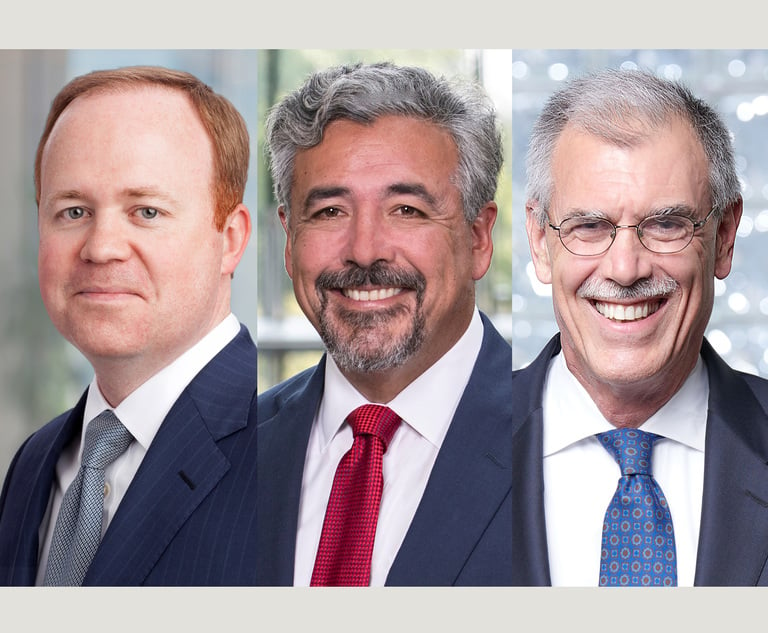Winston & Strawn Denies Ex-Partner's 'Firm Always Wins' Characterization
The firm, represented by Orrick at the US Supreme Court, is pressing its argument that a former partner's discrimination and retaliation claims must face confidential arbitration.
August 13, 2019 at 06:16 PM
4 minute read
The original version of this story was published on National Law Journal
 Joshua Rosenkranz. Photo: David Handschuh/ALM
Joshua Rosenkranz. Photo: David Handschuh/ALM
Lawyers for Winston & Strawn pressed their argument at the U.S. Supreme Court on Tuesday that a former partner should be forced to make her discrimination and retaliation claims through a confidential arbitration proceeding and not in court.
The former San Francisco-based partner, Constance Ramos, sued Winston & Strawn in California state court for allegedly passing her over for work and effectively forcing her out of the firm. Ramos, who now works at her own firm, Akira IP, defeated Winston & Strawn’s drive to keep her claims out of court.
The dispute is the latest at the Supreme Court that presents a clash between employment practices and the Federal Arbitration Act, and the case arrives at a time when more female lawyers are suing firms for alleged gender discrimination.
Winston & Strawn’s lawyers at Orrick, Herrington & Sutcliffe said in their new Supreme Court filing that the Ramos case presents issues that “are tremendously consequential to employers with a California presence.”
Central to the case is the 2000 California state court decision in Armendariz v. Foundation Health Psychcare Services. Orrick partner E. Joshua Rosenkranz, lead counsel for Winston & Strawn, told the Supreme Court that Ramos’s win “is emblematic of California courts’ adherence to the overtly arbitration-disfavoring rules” that were established in the Armendariz decision.
Ramos’s lawyer, Karla Gilbride of Public Justice, told the justices last month that Ramos would have won her challenge irrespective of the Armendariz ruling. Rosenkranz, in his new filing, portrayed Ramos’s high-court pleadings as downplaying the centrality of the Armendariz decision.
“To say ‘[t]he opinion below cited to Armendariz,’ is like saying Moby-Dick mentions a whale. Armendariz is a dominant presence in the opinion below,” Rosenkranz wrote.
Gilbride, urging the justices to uphold Ramos’s California state court win, said Winston & Strawn’s “overly harsh” terms in the firm’s partnership agreement drove the California state ruling against the law firm. Gilbride described one of those terms as the “firm always win” clause.
“Winston chose to include that highly unusual ‘firm always wins’ clause in its partnership agreement, and it is that decision—not anything the California Supreme Court said 20 years ago in Armendariz—that placed Winston in the position in which it now finds itself,” Gilbride told the justices. She said the California Court of Appeal “concluded that this ‘firm always wins’ clause would make it impossible for the arbitrators to award Ramos back pay, front pay, reinstatement or punitive damages.”
Rosenkranz, co-leader of Orrick’s Supreme Court and appellate practice, took issue with the description of that clause.
“She tendentiously calls it the ‘firm always wins’ clause, and mentions it 27 times,” he wrote. “It is more appropriately called the ‘partnership judgment’ provision, as it simply means that an arbitrator may not second-guess the partnership with respect to business matters.”
Winston & Strawn’s lawyers said Ramos “offered no evidence that anyone in the history of the firm had ever read it that way—much less enforced it.”
“A much more natural reading is the one the trial court adopted—that the provision is akin to the business judgment rule, under which courts defer to the judgment of corporate directors in the exercise of their broad discretion in making corporate policy decisions,” Rosenkranz wrote in Tuesday’s filing.
There’s no certainty the Supreme Court will agree to hear Winston & Strawn’s petition. The firm has garnered support from business advocates, and one Big Law firm, Ropes & Gray, filed an amicus brief backing arguments that Ramos’s claims should be pushed into arbitration.
Ramos was the highest-billing income partner in Winston & Strawn’s San Francisco office in 2016, her lawyer said in court filings. Ramos joined Winston & Strawn from Hogan Lovells.
Read more:
Ex-Winston Partner, Suing Firm, Asks Justices to Uphold a Ruling Against Arbitration
Denied Anonymity, Ex-Jones Day Associate Retreats as Gender Bias Representative
Appellate Pro Steffen Johnson Leaves Winston & Strawn
Big Law Touts Arbitration in Winston & Strawn’s SCOTUS Case Against Ex-Partner
Roberts Delivers Latest Pro-Arbitration Ruling for Divided Court
Ex-Winston Partner Defeats Arbitration Bid in Gender Bias Suit
This content has been archived. It is available through our partners, LexisNexis® and Bloomberg Law.
To view this content, please continue to their sites.
Not a Lexis Subscriber?
Subscribe Now
Not a Bloomberg Law Subscriber?
Subscribe Now
NOT FOR REPRINT
© 2025 ALM Global, LLC, All Rights Reserved. Request academic re-use from www.copyright.com. All other uses, submit a request to [email protected]. For more information visit Asset & Logo Licensing.
You Might Like
View All
MoFo Associate Sees a Familiar Face During Her First Appellate Argument: Justice Breyer

Litigators of the Week: 3 Former SGs Team Up In a Major Opioid Win for Pharmacies at the Ohio Supreme Court

'The Most Peculiar Federal Court in the Country' Comes to Berkeley Law

Litigators of the Week: The Eighth Circuit Knocks Out a $564M Verdict Against BMO in Ponzi Case
Trending Stories
Who Got The Work
J. Brugh Lower of Gibbons has entered an appearance for industrial equipment supplier Devco Corporation in a pending trademark infringement lawsuit. The suit, accusing the defendant of selling knock-off Graco products, was filed Dec. 18 in New Jersey District Court by Rivkin Radler on behalf of Graco Inc. and Graco Minnesota. The case, assigned to U.S. District Judge Zahid N. Quraishi, is 3:24-cv-11294, Graco Inc. et al v. Devco Corporation.
Who Got The Work
Rebecca Maller-Stein and Kent A. Yalowitz of Arnold & Porter Kaye Scholer have entered their appearances for Hanaco Venture Capital and its executives, Lior Prosor and David Frankel, in a pending securities lawsuit. The action, filed on Dec. 24 in New York Southern District Court by Zell, Aron & Co. on behalf of Goldeneye Advisors, accuses the defendants of negligently and fraudulently managing the plaintiff's $1 million investment. The case, assigned to U.S. District Judge Vernon S. Broderick, is 1:24-cv-09918, Goldeneye Advisors, LLC v. Hanaco Venture Capital, Ltd. et al.
Who Got The Work
Attorneys from A&O Shearman has stepped in as defense counsel for Toronto-Dominion Bank and other defendants in a pending securities class action. The suit, filed Dec. 11 in New York Southern District Court by Bleichmar Fonti & Auld, accuses the defendants of concealing the bank's 'pervasive' deficiencies in regards to its compliance with the Bank Secrecy Act and the quality of its anti-money laundering controls. The case, assigned to U.S. District Judge Arun Subramanian, is 1:24-cv-09445, Gonzalez v. The Toronto-Dominion Bank et al.
Who Got The Work
Crown Castle International, a Pennsylvania company providing shared communications infrastructure, has turned to Luke D. Wolf of Gordon Rees Scully Mansukhani to fend off a pending breach-of-contract lawsuit. The court action, filed Nov. 25 in Michigan Eastern District Court by Hooper Hathaway PC on behalf of The Town Residences LLC, accuses Crown Castle of failing to transfer approximately $30,000 in utility payments from T-Mobile in breach of a roof-top lease and assignment agreement. The case, assigned to U.S. District Judge Susan K. Declercq, is 2:24-cv-13131, The Town Residences LLC v. T-Mobile US, Inc. et al.
Who Got The Work
Wilfred P. Coronato and Daniel M. Schwartz of McCarter & English have stepped in as defense counsel to Electrolux Home Products Inc. in a pending product liability lawsuit. The court action, filed Nov. 26 in New York Eastern District Court by Poulos Lopiccolo PC and Nagel Rice LLP on behalf of David Stern, alleges that the defendant's refrigerators’ drawers and shelving repeatedly break and fall apart within months after purchase. The case, assigned to U.S. District Judge Joan M. Azrack, is 2:24-cv-08204, Stern v. Electrolux Home Products, Inc.
Featured Firms
Law Offices of Gary Martin Hays & Associates, P.C.
(470) 294-1674
Law Offices of Mark E. Salomone
(857) 444-6468
Smith & Hassler
(713) 739-1250






